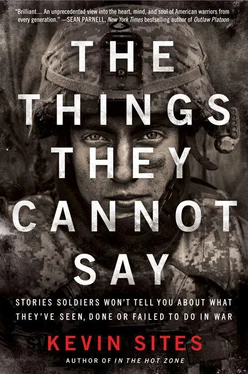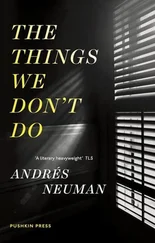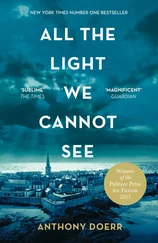Over the next few weeks I only see Schoonhoven sporadically, as he’s the shop’s primary boat driver and dive master, while I, as a forty-six-year-old man, begin my Karate Kid–type diving apprenticeship, in which I paint, fill air cylinders, haul empty tanks, repair scuba gear, fix boat docks and even serve rum punch for Monday-night appreciation mixers with the customers, all in exchange for the knowledge and training I need to become a dive master myself.
For me, as I mentioned earlier, it’s a useful and voluntary exile from my Los Angeles home, following the slow, whimpering death of my last relationship, and an attempt to outrun my growing sense of self-hatred stemming from the mistakes I feel I made as a combat correspondent.
Schoonhoven’s circumstances are similar only in the sense of needing an urgent escape from bad judgments. Following his deployments to Iraq and Afghanistan, Schoonhoven became increasingly restless.
“I needed to drink and drink, one beer after another,” he tells me one day while we’re filling tanks together at the shop, “just so I could fall asleep.” I’m thoroughly familiar with the process. Insomnia and alcohol and drug abuse are the holy trinity of post-traumatic stress disorder.
Later, after he begins to trust me more, Schoonhoven tells me over a few beers after work at a bar called Cities that back in Holland he had started drinking more heavily, using recreational drugs and getting into fights.
“It’s exciting,” he says after taking a sip of his beer and looking out over the water, almost nostalgic. “You’re all pumped up and hitting each other but don’t really feel anything because of the drinking and other things.”
But Schoonhoven knew he couldn’t continue this way for long. Since he was also newly married, he had to be concerned with more than just himself. When his wife, Carolien, a schoolteacher, was offered a job teaching in Bonaire, the couple thought that leaving Holland might be a good way to give them both a fresh start. She would teach, he would drive a boat and lead divers underwater and both of them hoped they could leave the wars behind.
It takes nearly two months of our working the shop together, but Schoonhoven finally decides he trusts me enough to tell me about his experiences in Iraq and Afghanistan. In that time we’ve become drawn to each other in the way of those who share an uncommon experience. It’s a tentative friendship at first, between an ex-soldier and a journalist, but the bonds are forged in a number of ways: through the small talk we make while delivering air tanks to other locations in the shop’s pickup truck, through fixing and repairing things together, but perhaps more so when he shares the bounty of his natural abilities, giving me tips for finding the boat underwater before I lead my first dive and also teaching me how to drive and dock the boat without pulling up short or smashing into the pilings. We’ve also discovered that we share a mutual interest in the kind of diving that will eventually cause both of us a lot of grief—going deep.
We share a need for danger, like so many in the aftermath of combat, as psychiatrist Jonathan Shay noted in Odysseus in America : “Prolonged combat leaves some veterans with the need to live on the edge, to pose the same question to the cosmos over and over again: yes or no?”
School was never an easy fit for Schoonhoven. Intelligent but dyslexic, he had a hard time with the standard book-work curriculum. His parents divorced when he was three, creating for him some lingering anxiety and restlessness. At times, he could be a troublemaker at school, getting caught smoking and fighting one too many times and finally kicked out at the age of sixteen. It was, his mother figured, a good time for him to live with his father. Perhaps time with an adult male role model might help him straighten out. The move seemed to work. Schoonhoven went to culinary school and became a chef. Food wasn’t about reading and studying. It was real and in front of him, something he could manipulate with his hands, at which he had always been skilled. After graduating, he got a job at a top restaurant in the city of Eindhoven, where he worked for three years. He did well and made money, but as often happened with him, he became bored and restless again. Then he decided there was one job that might be able to keep his interest: becoming a soldier in the Royal Netherlands Army.
He joined in January of 2003 on the buildup to the American-led invasion of Iraq, which would begin later that spring. It was a war the Dutch government would support with words and troops. After completing a fitness test with high scores, he was given a choice of units. He chose the most frequently deployed in the Dutch army, Air Mobile, with their distinctive red berets. He was trained to fire Dragon antitank missiles and by March 2004 was deployed with his unit near the village of al-Khidr in southern Iraq. It was a relatively short deployment of only four and a half months. But while guarding a bridge one day, two men on a scooter drove by and lobbed a couple of hand grenades at the Dutch soldiers. The explosion killed a Dutch sergeant. He was an experienced soldier who Schoonhoven says helped him with his training and whom he often looked up to as a role model.
“I was fucking angry after the attack,” Schoonhoven tells me over beers at Shoreside Restaurant in Bonaire’s capital of Kralendijk. “All we did later was sit on the base after.” With no retaliation for the grenade attack, Schoonhoven says he became more and more frustrated. But the unit never got their chance to hit back before being rotated home to the Netherlands.
Despite his anger at what had happened in Iraq, Schoonhoven was discovering something else about himself in the army—he fit in.
“For one of the first times in my life, I felt like I belonged,” says Schoonhoven. “Dyslexia, all the other stuff, didn’t matter anymore. I was in charge.”
But that didn’t mean he stopped getting in trouble. Back in Holland, Schoonhoven’s anger simmered. In the barracks he would listen to Nirvana with his fellow soldiers, go out drinking and get into fights. After getting arrested during one of the fights, Schoonhoven knew he had to straighten up or risk losing the only place that really felt like home to him, the army. After being back from Iraq for almost two years, he decided to focus on soldiering. He tested so well on the shooting range that they offered him a chance at long-distance shooter school. He jumped at it. During the training he learned camouflage, stalking and the Zen of breathing, but most of all he learned patience, something that didn’t come easy for the then twenty-three-year-old. This carried over to the other parts of his life as well, allowing him to deepen his relationship with Carolien, the girlfriend who would shortly become his wife.
In July 2006, with his newly acquired sniper training, Schoonhoven and his 11th Air Mobile Brigade headed to war again, but this time to Afghanistan.
“When I left this time, I knew something was going to happen,” Schoonhoven says. “I told Carolien, ‘This time we’re going to fight.’”
The Dutch deployment to Afghanistan in 2006 was concentrated in Uruzgan Province, north of the restive cities of Helmand and Kandahar, former Taliban strongholds and still rife with sympathizers.
The fifteen hundred Netherlands troops were the seventh-largest contingent of the NATO-led multinational force in Afghanistan and had a mission statement that put as great an emphasis on building community as providing security. But Schoonhoven hoped this deployment would turn out different than in Iraq; there he had felt powerless, almost locked down on base, after the killing of their sergeant. While he didn’t go to Afghanistan looking for revenge, he was prepared to fight. It wouldn’t be long before he got his chance.
Читать дальше












